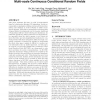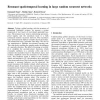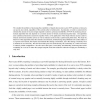316 search results - page 26 / 64 » On the Space Complexity of Randomized Synchronization |
122
click to vote
ECCV
2006
Springer
16 years 2 months ago
2006
Springer
Belief propagation (BP) has become widely used for low-level vision problems and various inference techniques have been proposed for loopy graphs. These methods typically rely on a...
111
click to vote
CIKM
2009
Springer
15 years 7 months ago
2009
Springer
This paper addresses the issue of social recommendation based on collaborative filtering (CF) algorithms. Social recommendation emphasizes utilizing various attributes informatio...
143
click to vote
BC
2002
15 years 9 days ago
2002
Taking a global analogy with the structure of perceptual biological systems, we present a system composed of two layers of real-valued sigmoidal neurons. The primary layer receives...
117
click to vote
SRDS
2003
IEEE
15 years 5 months ago
2003
IEEE
We consider the problem of increasing the availability of shared data in peer-to-peer (P2P) systems so that users can access any content, regardless of the current subset of onlin...
125
click to vote
ICS
2010
Tsinghua U.
15 years 9 months ago
2010
Tsinghua U.
Computation in the physical world is restricted by the following spatial locality constraint: In a single unit of time, information can only travel a bounded distance in space. A ...



